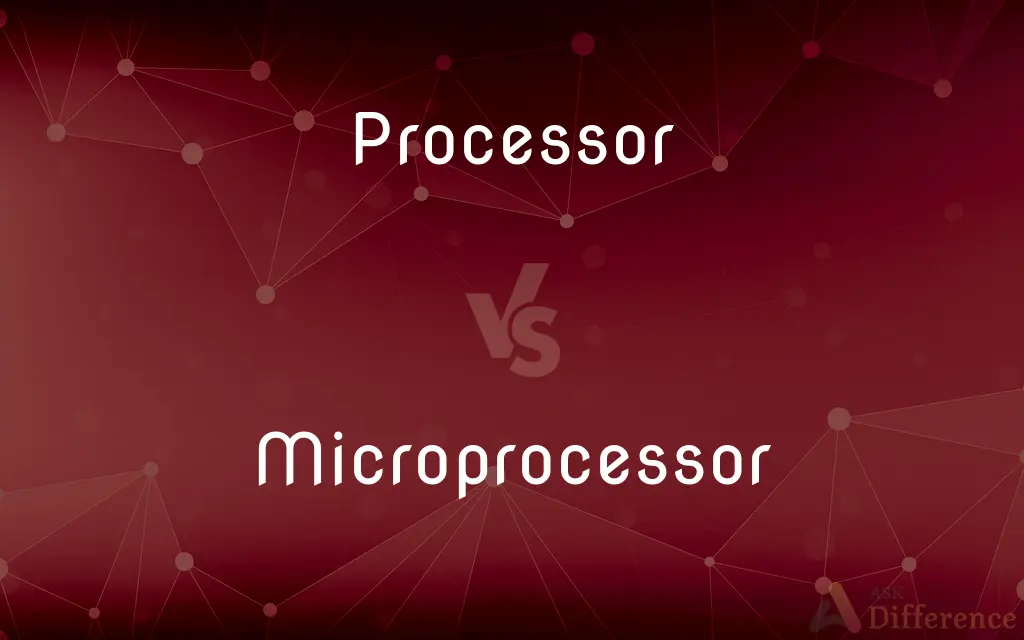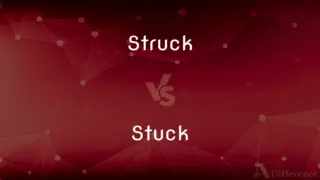Processor vs. Microprocessor — What's the Difference?
By Tayyaba Rehman — Updated on September 23, 2023
A processor is a device that executes instructions, while a microprocessor is a type of processor on a single integrated circuit (IC). Both are central to computing tasks.

Difference Between Processor and Microprocessor
Table of Contents
ADVERTISEMENT
Key Differences
The term "processor" broadly refers to a device or component that processes data or instructions. Processor is an encompassing term that can refer to central processing units (CPUs), graphics processing units (GPUs), and more. It's essentially the brain of a computer system, performing calculations, executing tasks, and managing operations based on a set of instructions.
Contrastingly, the term "microprocessor" is more specific. A microprocessor is a type of processor that resides on a single integrated circuit (IC). It's a compact unit, bringing the functionalities of a CPU onto a small chip. Developed in the 1960s, microprocessors revolutionized computing by miniaturizing and centralizing the processing functions.
While every microprocessor is a processor, not every processor is a microprocessor. Processors can be found in a variety of devices, from computers to appliances, and can vary in complexity and function. Microprocessors, with their compact design, are specifically utilized in personal computers and many electronic devices.
To understand the distinction further, consider the broader electronics industry. Processors are used in numerous devices, including those that require significant processing power like servers or workstations. Microprocessors, given their small size and efficiency, are more commonly associated with personal computing devices, mobile phones, and modern appliances.
Comparison Chart
Definition
A device/component that processes data or instructions.
A processor on a single integrated circuit (IC).
ADVERTISEMENT
Scope
General term encompassing CPUs, GPUs, etc.
Specifically refers to CPUs on a single chip.
Presence
Found in a wide range of electronic devices.
Commonly in personal computers and electronic devices.
Complexity
Can vary in complexity and function.
Typically optimized for general computing tasks.
Form Factor
Can be multiple ICs or components.
A single IC design.
Compare with Definitions
Processor
An electronic component that interprets and executes instructions.
The computer's processor speeds up its performance.
Microprocessor
A compact processor located on a single integrated circuit.
The latest microprocessor in the market promises faster speeds.
Processor
The brain of a computer system responsible for task execution.
A faster processor can handle multitasking efficiently.
Microprocessor
A central processing unit designed for personal computers.
The PC uses a high-end microprocessor for gaming.
Processor
A key component in determining a device's computational capabilities.
With a modern processor, the laptop runs high-end applications smoothly.
Microprocessor
A miniaturized version of a processing unit for electronic devices.
Smartphones today boast powerful microprocessors.
Processor
A device that manages and oversees operations in a system.
The new phone features a powerful processor.
Microprocessor
A specific type of processor revolutionizing modern computing.
The invention of the microprocessor changed the tech industry.
Processor
A broad term including various data processing units.
This device comes with both a main processor and a graphics processor.
Microprocessor
An integrated unit handling computing functions in small-scale systems.
With an advanced microprocessor, the tablet performs tasks quickly.
Processor
A machine that processes something
The processor overexposed the film
Microprocessor
A microprocessor is a computer processor wherein the data processing logic and control is included on a single integrated circuit, or a small number of integrated circuits. The microprocessor contains the arithmetic, logic, and control circuitry required to perform the functions of a computer’s central processing unit.
Processor
One that processes, especially an apparatus for preparing, treating, or converting material
A wood pulp processor.
Microprocessor
An integrated circuit that contains a major processing unit of a computer on a single microchip, such as the central processor or the graphics processor.
Processor
A computer.
Microprocessor
(computer hardware) the entire CPU of a computer on a single integrated circuit (chip).
Processor
A central processing unit.
Microprocessor
Integrated circuit semiconductor chip that performs the bulk of the processing and controls the parts of a system;
A microprocessor functions as the central processing unit of a microcomputer
A disk drive contains a microprocessor to handle the internal functions of the drive
Processor
A program that translates another program or a data file into a form acceptable by the computer being used.
Processor
A person or institution who processes things (foods, photos, applications, etc.).
He is a loan processor with a bank.
Processor
A device which processes, which changes something (a computer processor, food processor, etc.).
The food processor shredded the vegetables.
Processor
A central processing unit.
This mainframe's processor is fast.
Processor
A microprocessor.
This computer has two processors, but only one keyboard.
Processor
A business engaged in processing agricultural products and preparing them for market
Processor
Someone who processes things (foods or photographs or applicants etc.)
Processor
(computer science) the part of a computer (a microprocessor chip) that does most of the data processing; the CPU and the memory form the central part of a computer to which the peripherals are attached
Common Curiosities
Can processors be found outside of computers?
Yes, processors are found in many devices, from phones to home appliances.
Does a more advanced processor always mean better performance?
Generally, a more advanced processor offers better performance, but other factors, like software optimization, also matter.
What makes a microprocessor distinct from other processors?
A microprocessor is a processor on a single integrated circuit (IC).
Why was the invention of the microprocessor significant?
The microprocessor miniaturized and centralized computing functions, making personal computing possible.
Is every microprocessor also considered a processor?
Yes, every microprocessor is a type of processor.
Can a device have more than one processor?
Yes, devices can have multiple processors or multi-core processors for enhanced performance.
What factors affect a processor's speed?
Clock rate, architecture, and technology node are among factors affecting a processor's speed.
Do all smartphones have microprocessors?
Yes, all modern smartphones have microprocessors that manage their computational tasks.
What is a processor's primary role?
A processor's primary role is to execute instructions and manage computational tasks.
Is the microprocessor responsible for graphics in a computer?
While a microprocessor handles general tasks, graphics-specific tasks are often managed by a separate graphics processor.
How do manufacturers measure processor performance?
Processor performance is often measured using benchmarks, clock speeds, and real-world task evaluations.
How has processor technology evolved over time?
Processors have become more efficient, powerful, and compact over time.
Are microprocessors only used in computing devices?
No, microprocessors are also found in various electronics, from cars to smart appliances.
What's the relationship between a CPU and a microprocessor?
A CPU (Central Processing Unit) can be a microprocessor when it's on a single IC.
How do processors contribute to power consumption in a device?
Processors, especially when performing intensive tasks, can be major contributors to a device's power consumption.
Share Your Discovery

Previous Comparison
Evangelical vs. Pentecostal
Next Comparison
Struck vs. StuckAuthor Spotlight
Written by
Tayyaba RehmanTayyaba Rehman is a distinguished writer, currently serving as a primary contributor to askdifference.com. As a researcher in semantics and etymology, Tayyaba's passion for the complexity of languages and their distinctions has found a perfect home on the platform. Tayyaba delves into the intricacies of language, distinguishing between commonly confused words and phrases, thereby providing clarity for readers worldwide.
















































